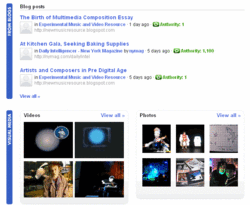 In the past week I’ve gotten a handful of questions (both in the comments here and face-to-face) about how Facebook applications will be monetized. I’ll provide some initial thoughts here and welcome your comments.
In the past week I’ve gotten a handful of questions (both in the comments here and face-to-face) about how Facebook applications will be monetized. I’ll provide some initial thoughts here and welcome your comments.
 First, we need to acknowledge that it’s early in the process. The Facebook API was launched May 25 – exactly seven weeks ago today. So, while there are some fairly obvious methods of monetizing Facebook traffic today, we can be sure that more interesting models will emerge in the months to come.
First, we need to acknowledge that it’s early in the process. The Facebook API was launched May 25 – exactly seven weeks ago today. So, while there are some fairly obvious methods of monetizing Facebook traffic today, we can be sure that more interesting models will emerge in the months to come.
The second acknowledgement is that Facebook is a platform; it does not come with a built-in monetization mechanism. Let’s remember how long it took before Google monetized its traffic, and then again before it provided the mechanisms (via AdSense) for others to do the same.
What the Facebook platform does provide is a distribution vehicle, enabling you access to a rapidly growing addressable market that already exceeds 24 million users. The platform also lends itself well to two well-established Internet monetization methods: advertising and eCommerce.
- Advertising: While other social networks have restricted the ability for 3rd party developers to run ads on their “widgets”, Facebook places no such restrictions. So, the most obvious method of monetizing a Facebook app is through development of an app that generates a lot of traffic and can serve ads. This model should work for traditional media businesses.
- ECommerce: The second method for generating revenue is through eCommerce. Today’s top Facebook app is iLike. iLike is a simple application that allows users to indicate their favorite music. iLike is positioned as a music discovery service in the same vein as Last.fm or Pandora. The iLike app for Facebook includes a link next to each song title, allowing users to buy that song, generating eCommerce transactions. They also have a concert tour module where you can see which performers are on tour, then purchase tickets. Developers could easily leverage existing affiliate marketing platforms (such as Amazon) to monetize traffic for books, movies or any other products.
So, is Facebook a cash machine for developers? Hardly. Building a business on the Facebook platform requires development of a compelling application that remains useful to the user over time. It will require tapping into viral markets, but also providing underlying marketing and PR to drive usage. The Field of Dreams approach will not work in this competitive landscape.
It’s also important to understand that generating traffic on Facebook is slightly different than that on other social networks. Most social network apps get viral by having users post a widget to their page, then having other users interact with it. As Lance Tokuda, CEO of RockYou points out in this VentureBeat article,
“...the viral loops for Facebook (there are several) revolve around the news feed, the mini feed and the invite request. Not around people coming to your page and interacting with it.”
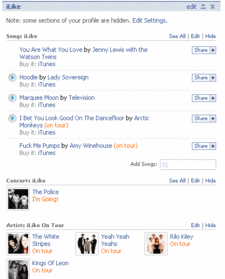 Meanwhile, Lightspeed Venture Partners' Jeremy Liew provides a better sense of how Facebook apps are valued. To Jeremy, there are four metrics that will determine the value of a Facebook app:
Meanwhile, Lightspeed Venture Partners' Jeremy Liew provides a better sense of how Facebook apps are valued. To Jeremy, there are four metrics that will determine the value of a Facebook app:
1. RPM (revenue per thousand page views (technically iframe views)). This metric captures the revenue, whether it’s driven by a CPM, CPC or CPA (cost-per-action) model.
2. Page views per user per month: many apps don’t generate many pageviews, as they simply display in a single iframe (such as a daily horoscope). Those that generate interaction with multiple pages will have higher value.
3. Monthly churn: the stickier the app, the more likely it will be retained over time.
4. Virality of the app (as described in the Lance Tokuda interview).
I also see opportunities to make money in serving the emerging Facebook ecosystem. In the first few weeks since the platform was announced, more than a thousand apps have been launched and tens of thousands of developer keys have been distributed by Facebook. As more and more apps emerge, there’s a need for a more comprehensive directory for users to find the apps they need. The existing “Top 10” list and broad categories are OK for starters, but they will always be dominated by large consumer apps. There’s a tremendous opportunity for someone to launch a more navigable app directory that connects users with the more specialized apps they require.
Of course, there will be companies who specialize in app development (as already exist for developing MySpace widgets) and for marketing of your apps, just as the SEO/SEM market has emerged around Google.
So what’s the best way to monetize Facebook? I think that Charlie O’Donnell says it best.
“It shouldn't be up to Facebook to figure out your business model”.
The Facebook platform can dramatically shorten time-to-market of new applications, and help drive traffic. But, it’s up to us to develop the applications and supporting business models to turn it into a business.






















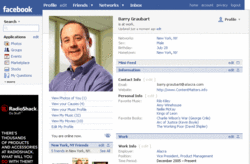

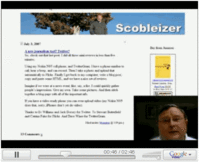
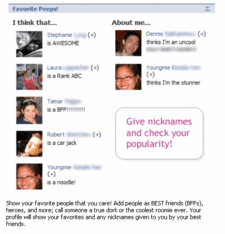 The latest this week was the acquisition of Favorite Peeps by slideshow creator Slide. Favorite peeps is a fairly simple apps that lets users display their favorite friends, providing their own details about them. It's a nice complement to Slide's TopFriends app.
The latest this week was the acquisition of Favorite Peeps by slideshow creator Slide. Favorite peeps is a fairly simple apps that lets users display their favorite friends, providing their own details about them. It's a nice complement to Slide's TopFriends app.




